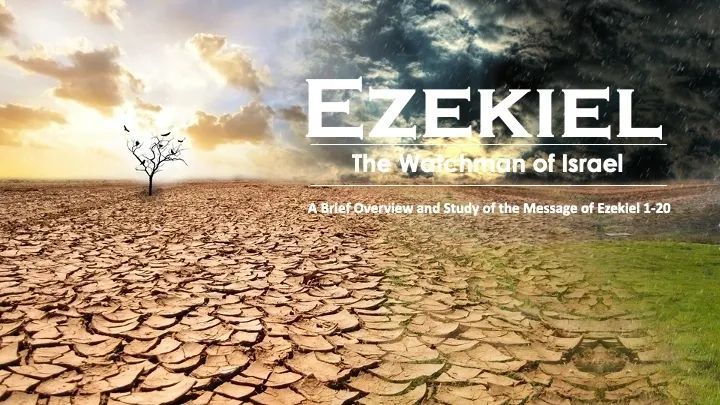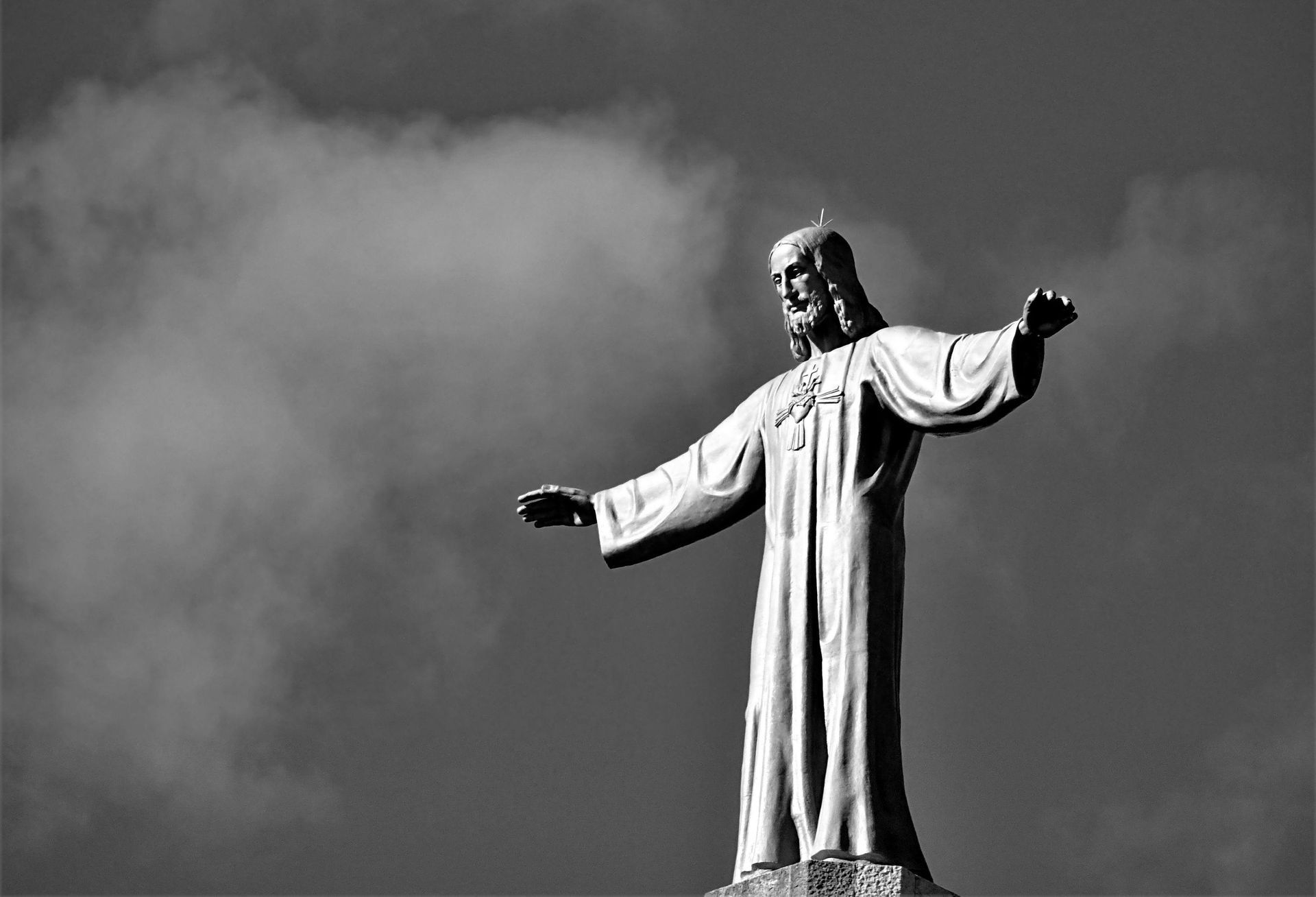Ezekiel: The Watchman of Israel
August 27, 2020

EZEKIEL
A Brief Overview of the First Twenty Chapters
The Book of Ezekiel may be one of the most unusual and confusing books in the Bible. The Lord led me to this book recently to do a slow study during my devotional reading. When you read Ezekiel, you feel like you are in outer space or in some type of warped reality, but when you begin to read it slowly, you see that the Lord uses a ton of symbolism as He communicates to His people Israel.
Through symbols and illustrations which often Ezekiel is called upon to personally and visually demonstrate, the Lord warns, condemns and encourages His people. Ezekiel is asked to cut off a part of his beard and burn it in front of the people. He is asked to carve on bricks, cook food over human waste and lay naked for days on end. Through it all, Ezekiel obediently follows the Lord command as His prophet and serves as the mouthpiece of God. His words are not comforting most of the time but condemning. Israel has strayed. They are playing the harlot with their idols like their forefathers, and God is not about to excuse their behavior. The Lord has placed Israel in the center of the nations (5:5) as a witness to the Lord, but they act as if they do not know Him. The phrase which dominates Ezekiel’s message is repeated in virtually every chapter: “And they shall know that I am the Lord.”
Placing Israel as the center of the nations, the Lord gave them all the benefits of His provision and His protection, but the people rebelled against it. God’s very purpose in placing them at the center of the nations was their testimony to His abundant love. They were to be the Lord’s hands, feet, and mouthpiece. Everything that God is was to be seen through their faith, their devotion, their kindness to the nations but most importantly, their holiness. However, they forsook the love of God for the love of idols. Look at just a few of the passages the Lord speaks through Ezekiel about their rebellion:
“And she has rebelled against my rules by doing wickedness more than the nations, and against my statutes more than the countries all around her; for they have rejected my rules and have not walked in my statutes” (5:6).
“Behold, the day! Behold, it comes! Your doom has come; the rod has blossomed; pride has budded. Violence has grown up into a rod of wickedness. None of them shall remain, nor their abundance, nor their wealth; neither shall there be preeminence among them” (7:10-11).
“Then he said to me, “Have you seen this, O son of man? Is it too light a thing for the house of Judah to commit the abominations that they commit here, that they should fill the land with violence and provoke me still further to anger? Behold, they put the branch to their nose” (8:17).
“And you shall know that I am the Lord. For you have not walked in my statutes, nor obeyed my rules, but have acted according to the rules of the nations that are around you” (11:12).
“But you trusted in your beauty and played the whore because of your renown and lavished your whorings on any passerby; your beauty became his” (16:15).
“How sick is your heart, declares the Lord God, because you did all these things, the deeds of a brazen prostitute” (16:30).
In the midst of all this rebellion and idolatry, the Lord is merciful. Simply by sending the prophet to the house of Israel, God was saying that I am patient and merciful. It broke God’s heart for the people to rebel against Him. When he spared some from His judgment, He said, “Then those of you who escape will remember me among the nations where they are carried captive, how I have been broken over their whoring heart that has departed from me, and over their eyes that go whoring after their idols” (6:9). To bring judgment upon His people broke the heart of God. Because the Lord is holy, He cannot be defiled by idolatry and had made a covenant with Israel that as they obeyed His rules and follow His statutes, He would bless them in the land and among the nations, but if they rebelled, He would discipline them. The Lord said plainly to Israel about His desire for them to obey and His brokenness over their rebellion, “Have I any pleasure in the death of the wicked, and not rather that he should turn from his way and live?” (18:23).
Perhaps the most heart breaking and most disturbing part of the first twenty chapters of Ezekiel is Israel’s brazen belief that they could live with their idols and still call on the Lord as if He would tolerate an anything goes lifestyle. Chapter 20 outlines Israel’s desire to have the Lord on their side but divide their allegiance with their idols. Israel wanted to cover all their bases, when the Lord was their base. In chapter 20, the Lord recounts Israel’s past failures and warns the people not to fall into the same pattern. Out of an abundance of mercy, He declares His power and determination to see His people to a new future where “with a mighty hand and an outstretched arm and with wrath poured out”, He would be their king (20:33). The final section of chapter 20 mentions the Lord’s deliverance coming from His holy mountain, the mountain height of Israel (20:40). In the next few verses, the Lord prophetically declares His purpose and provision:
“As a pleasing aroma I will accept you, when I bring you out from the peoples and gather you out of the countries where you have been scattered. And I will manifest my holiness among you in the sight of the nations. And you shall know that I am the Lord, when I bring you into the land of Israel, the country that I swore to give to your fathers. And there you shall remember your ways and all your deeds with which you have defiled yourselves, and you shall loathe yourselves for all the evils that you have committed. And you shall know that I am the Lord, when I deal with you for my name's sake, not according to your evil ways, nor according to your corrupt deeds, O house of Israel, declares the Lord God” (20:41-44).
This prophetic declaration is a foreshadowing of what the Lord would do on the mountain of Israel, His holy mountain. In the coming years, the Lord would Himself come in human flesh, live among the people, teach them and live the life they could not live in perfect obedience God the Father. Jesus Christ would ascend the holy mountain of God bearing a cross and lay down His life for every single human being past, present and future. His perfect life and the blood shed on the cross would be the payment for the house of Israel and for every Gentile whom God would adopt into His family by grace through faith (Eph. 2:8-9). The Lord would give those who trust in Him a new heart of flesh and remove the one of stone, so that they would turn their affections away from idols and to the Lord. When this would happen, those who trusted in Christ would know that He was the Lord.
This is God’s purpose for our lives --- to know Him! To know the Lord and live for Him are the two greatest realties in life. That we can have a relationship with the God of the universe is beyond comprehension. To have the privilege to live for Him is the greatest honor in life. Flowing from those two realities are further realties of His forgiveness, His grace, His peace, His gifting, His mission and His love that flows through us into the lives of every person we meet. This is what the Lord was after for Israel, but they chose to reject the Lord for their own pride and selfishness. What will you do? As you study these chapters, think of the heart of God that breaks when we turn away from Him. Think about the people who need to hear the Gospel. Think about how your life can be a witness to the love of God in our world.
Questions to Consider:
1. What overarching thought GRABBED you the most in these chapters?
2. What challenged you or bothered you as you read these chapters?
3. What did you learn about God?
4. What did you learn about the heart and ways of people?
5. What are the comparisons to Ezekiel’s day and our own?
6. How would you apply what you have read to your own personal life?
7. Were there SINS to avoid? PROMISES to claim? EXAMPLES to follow? Or COMMANDS to obey?
8. Pick out one point of application. How WILL you apply it this week? (Be SMART about this: Specific…Measurable…Attainable…Realistic…Timely).
Share this post:



